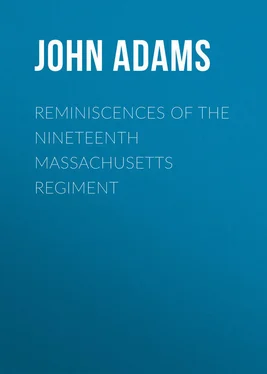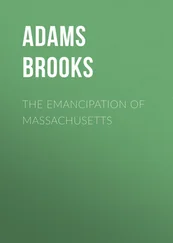John Adams - Reminiscences of the Nineteenth Massachusetts regiment
Здесь есть возможность читать онлайн «John Adams - Reminiscences of the Nineteenth Massachusetts regiment» — ознакомительный отрывок электронной книги совершенно бесплатно, а после прочтения отрывка купить полную версию. В некоторых случаях можно слушать аудио, скачать через торрент в формате fb2 и присутствует краткое содержание. Жанр: foreign_antique, foreign_prose, Историческая проза, на английском языке. Описание произведения, (предисловие) а так же отзывы посетителей доступны на портале библиотеки ЛибКат.
- Название:Reminiscences of the Nineteenth Massachusetts regiment
- Автор:
- Жанр:
- Год:неизвестен
- ISBN:нет данных
- Рейтинг книги:4 / 5. Голосов: 1
-
Избранное:Добавить в избранное
- Отзывы:
-
Ваша оценка:
- 80
- 1
- 2
- 3
- 4
- 5
Reminiscences of the Nineteenth Massachusetts regiment: краткое содержание, описание и аннотация
Предлагаем к чтению аннотацию, описание, краткое содержание или предисловие (зависит от того, что написал сам автор книги «Reminiscences of the Nineteenth Massachusetts regiment»). Если вы не нашли необходимую информацию о книге — напишите в комментариях, мы постараемся отыскать её.
Reminiscences of the Nineteenth Massachusetts regiment — читать онлайн ознакомительный отрывок
Ниже представлен текст книги, разбитый по страницам. Система сохранения места последней прочитанной страницы, позволяет с удобством читать онлайн бесплатно книгу «Reminiscences of the Nineteenth Massachusetts regiment», без необходимости каждый раз заново искать на чём Вы остановились. Поставьте закладку, и сможете в любой момент перейти на страницу, на которой закончили чтение.
Интервал:
Закладка:
For the number of men engaged this was the most disastrous battle of the war. No man in his right mind would have sent out such an expedition. There was no way to retreat and no chance to send reinforcements, except a scow load at a time. The movement was condemned by every one. It was said that General Stone was a traitor, that signal lights would be placed at a house on the Virginia side and that he would go down to the river and meet men from the rebel army. The truth we never knew, but General Stone was relieved, and it was late in the war before he was given another command.
While we were engaged at the bluff Company K crossed at Edward’s Ferry with General Lander. They had a sharp skirmish with the rebels and our brave brigade commander received the wound which resulted in his death soon after. We returned to our old camp and were soon busy getting ready for winter.
About this time we were called upon to bear our first loss, not by death but by the resignation of Captain Stanwood. Lieutenant Merritt was promoted to the vacant position, Second Lieutenant Boyd to first lieutenant and Quartermaster Sergeant O. F. Briggs to second lieutenant.
We were about to undergo our first winter in camp and had not learned to stockade our tents; we pinned them close to the ground, dug a flue for a fireplace, building a chimney outside topped with a barrel, and had plenty of smoke but little fire. Neither had we yet learned the art of sleeping in tents; we would put on all our clothes, including overcoats, bring the capes up over our heads, lie down and shiver. Experience soon taught as that to undress and throw our clothing over us was much the better way.
On Thanksgiving the officers of the regiment gave a ball; men were detailed to build a ball-room, and quite a nice building was the result of their labors. Ladies came from Washington and Baltimore and a good time was enjoyed. We enlisted men looked on from a distance and thought of the pleasures we had surrendered for a chance to serve our country.
After getting snugly fixed for winter an order came to move, and soon we were on the march for Muddy Branch, to take the place of General Banks’s division, which had been ordered to Harper’s Ferry. Here the regiment was assigned various duties. A part of Company A was sent to Rockville. First Sergeant Cook, myself as corporal, and ten men were ordered to Darnestown. Our quarters at Darnestown were in an old barn on the main street, and at Rockville in buildings on the fair ground. Our duty at Darnestown was to prevent men coming to town from camp and to allow none to pass towards Washington, below the rank of a brigadier-general, without proper papers. We had three posts, each at a store. The citizens of the town were in sympathy with the South, but as we behaved like gentlemen they were very kind, often sending us biscuits for breakfast and at Christmas furnishing a liberal supply of egg-nog. We were welcomed at any house, and often when off duty spent a pleasant hour by their firesides. Soon after we began duty Sergeant Cook received a furlough of thirty days and I was commander-in-chief of the Darnestown army.
I had no trouble with the enlisted men, but the officers “kicked” when I asked them to show their leave of absence. My duty was to inspect the coach when it arrived on its way to Washington, and if any officer or soldier was on board to ask him to show his pass. I will relate one instance. I opened the coach door one morning and said, “I will see your leave of absence, if you please,” to an officer who wore the strap of a major. He growled out, “Call your officer; I don’t show my leave of absence to any enlisted man.” I replied, “I am the only officer here; I have my orders in writing from headquarters and know my duty.” He put his head out of the coach window and said, “Driver, go on.” I called to the sentry on duty, “If that driver starts, shoot him off the box.” The driver did not start, and after swearing awhile the major gave in, but declared he would report me, – and he did. In a few days Major How rode up. I turned out the guard, and after presenting arms stood at attention. “Corporal, dismiss your guard, I want to see you a moment.” Taking me one side he said, “You have been reported to the headquarters of the regiment.” I explained the case to him. He patted me on the shoulder and said, “Corporal, you are right; you are in command of this post, and if the Apostle Paul undertakes to go through this town, unless he wears the uniform of a brigadier-general, don’t you let him go without showing his pass, and if he refuses bring him to camp.” No corporal in the Union army felt better than I did that day, and I was glad that the major had reported me.
In February we were relieved by another detail from the regiment and ordered to Rockville. The night before we left, Mrs. Hayes, of one of the first families of the town, gave us an oyster supper, and her daughter, who was a pleasant young lady but a red-hot “reb,” presented me with a rebel flag. Thirty-eight years have passed since those days, but I shall never forget the kindness of those Darnestown people, and trust that to-day they are prosperous and happy.
After a time we reported to the company at Rockville and found the three field officers examining the non-commissioned officers. Although we had been acting as “non-coms” since we left Massachusetts, none had received warrants from the colonel. First Sergeant Cook and I joined the procession. I was never more frightened in my life, as I had never spoken to the colonel or lieutenant-colonel, and the examination was unexpected. The marks were from one to five. In a few days, at dress parade, Captain Merritt read the list. He called First Sergeant Adams. I thought he meant my brother Isaac, who had been examined as a sergeant, and I was pleased with his good fortune, when the captain called “First Sergeant J. G. B. Adams,” and explained to the company that I had passed the best examination and was promoted to that position. I did not want the place. First Sergeant Cook was a good man and was my friend. I went to the captain, told him I would prefer to be second sergeant and let First Sergeant Cook remain. This arrangement was made and I was happy.
Our duty at Rockville was very light. The boys had made the acquaintance of many agreeable people there; I was introduced, and the time passed pleasantly.
The colored people were holding revival meetings. As we had never witnessed anything of the kind before we all attended, without regard to religious convictions. The singing was of that wild, melodious nature that only colored people can render. The clapping of hands and stamping of feet, all in time, cause a thrill of excitement to run through the coldest veins. With the colored people the effect is such that they are lost to all else but the emotions of the hour. When striving with the spirit it is a strife in reality. One night they held a meeting of unusual interest, and Company A was represented by a large delegation. Among the number was Uncle Ben Falls. Ben had joined the company just before we left Lynnfield. He had been a sailor and his kind heart and ready wit made him a favorite with all. That night Ben was deeply interested. He joined in the hymn, and although his voice might not accord with the rest there was no doubt but what he sang with the same spirit. Soon the excitement reached its height; sobs and groans were heard in all parts of the room, shouts of “Glory!” went up from every heart. The spirit took possession of a girl named Malinda, who was owned at the hotel where our officers boarded, and was acquainted with our boys. She shrieked and groaned and in her striving fell to the floor. The people shouted, “Hold Malinda! Oh, Lord, hold Malinda! The spirit has got Malinda! Oh, Lord, hold her!” but none went near her. This was too much for Ben. He rushed to the front, sat on her and held her down. This brought Malinda and the rest to their senses and the meeting soon closed.
Читать дальшеИнтервал:
Закладка:
Похожие книги на «Reminiscences of the Nineteenth Massachusetts regiment»
Представляем Вашему вниманию похожие книги на «Reminiscences of the Nineteenth Massachusetts regiment» списком для выбора. Мы отобрали схожую по названию и смыслу литературу в надежде предоставить читателям больше вариантов отыскать новые, интересные, ещё непрочитанные произведения.
Обсуждение, отзывы о книге «Reminiscences of the Nineteenth Massachusetts regiment» и просто собственные мнения читателей. Оставьте ваши комментарии, напишите, что Вы думаете о произведении, его смысле или главных героях. Укажите что конкретно понравилось, а что нет, и почему Вы так считаете.












